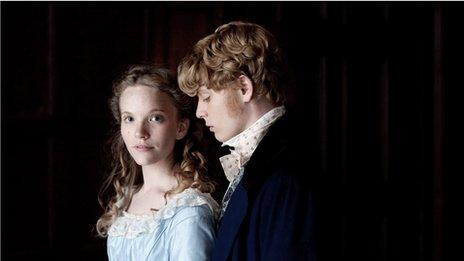Should unfinished works be left untouched?
- Published

Spoiler alert: Plot details revealed below
A new adaptation of Charles Dickens' unfinished novel, The Mystery of Edwin Drood, was given an ending. But should unfinished works be left untouched, asks Sarah Barclay.
It's infuriating that of all the works he could have left unfinished, Dickens managed to die in the middle of a murder mystery.
This week the BBC attempted to solve The Mystery of Edwin Drood. Writer Gwyneth Hughes not only adapted Dickens's half-written novel into a new television drama but also gave it an ending of her own.
"I read the book and thought it was brilliant," Hughes says. "But when you're watching a drama, the only question that matters is how is it all going to turn out. To use Alfred Hitchcock's phrase, it's what keeps your bum glued to the seat."
Hughes's inspiration was the writings of Dickens' daughter Katie. She advised remembering what her father was best at - his strange and fantastic insights into the human heart.
"I felt emboldened by this to go where the characters took me, and hope that people who love the book - even if they don't like what I've done with the mystery - [would] still love Dickens's characters."
There's a long list of great authors who have left work unfinished, often because of illness or death. Jane Austen, the Bronte sisters, Albert Camus, Franz Kafka, to name but a few. An industry has grown up around them, of so-called "continuators" - writers eager to finish the stories that they began.
There have been a number of continuations of Austen's Sanditon, including efforts by Juliette Shapiro and Reginald Hill, author of the Dalziel and Pascoe series. Austen had only got 11 chapters in when she stopped, enough to establish the characters, but leaving the continuators plenty of room for manoeuvre.
But why would a writer choose to finish the work of another author, rather than create original work? Surely that leads to pastiche?
It's dangerous territory, suggests Prof John Mullan, who is currently writing a book on Austen. "What we expect when we read the work of Austen, or Dickens, or Laurence Sterne, is a particular voice, and that's terribly difficult to bring off."
It's a risky strategy for an author, but perhaps it speaks to a profound need in all of us. The literary critic Frank Kermode wrote in his book Sense of an Ending about our deep-rooted need to be rewarded with conclusions.

It's claimed Stieg Larsson had written three-quarters of a fourth "Dragon Tattoo" book before he died
John Sutherland, emeritus professor at University College London, agrees. "Kermode famously observed that when we hear a clock go tick tick tick, what we hear is tick tock tick tock, because we like beginnings and endings. We're hardwired, like lemmings going over a cliff."
But do we have the right to finish the work of others? Leonardo Da Vinci, who observed that "works of art are never finished, only abandoned", only painted 15 canvases in his lifetime, four of which remain unfinished.
It was a tradition in Renaissance times to let apprentices complete paintings started by a master. In modern times, we have a different understanding of creative ownership.
Critic Mark Lawson believes that completing the work of others only serves to muddy our understanding of the arc of their work. In the case of Ernest Hemingway, he resents the publishing of cobbled together scraps and notebooks masquerading as previously unpublished new work.
"This is a form of literary necrophilia which completely alters the shape of an artist's life," Lawson suggests.
On the other hand, you have the case of Franz Kafka. Had his friend Max Brod not ignored instructions to burn the manuscripts of his unfinished novels, and not organised and published them, we would be denied The Trial, arguably one of the 20th Century's most influential works.
It's thought Kafka had nearly completed the trial but it's not known how much Brod edited or re-organised his work before publication.
Literary necrophilia is a term that could also describe the phenomenon of extending a writer's body of work after their death. It's become a lucrative business. Recently Sherlock Holmes and James Bond have both been reincarnated to die another day.
Established authors like Sebastian Faulks and Jeffrey Deaver have written new novels about 007. Along with the very successful film franchise, which itself has grossed a staggering £5bn, the Ian Fleming estate perhaps hopes new works will both please fans and keep interest alive in the original Bond novels.
Over three million copies were sold worldwide in the last five years.
Successful franchises like Sherlock and Bond are testament to our passion for the worlds they unlock, and the characters they unleash. The fact is, some of the characters brought to life in the work of great novelists become like friends from whom we can't bear to part. Dickens would surely have understood this.
Continuators aren't usually hoping to provide a definitive version or ending. Indeed, Hughes hopes that in finishing the Mystery of Edwin Drood, she has not put a full stop on the whole business.
"I hope there'll be a national debate about whether we've done this right. I hope people will enjoy Drood for what it is, one of many possible endings.
"Why are we fascinated with the unfinished masterpieces that some of our greatest authors and artists have left behind, and why do we feel the need to finish them?"